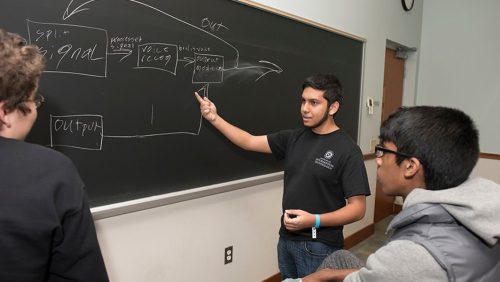As a student at Johns Hopkins, the nation’s leading research university, you’ll have opportunities that other schools simply cannot offer.
Our collaborative culture and the emphasis we place on the integration of research and education means that as an undergraduate, you’ll have the chance to conduct research and create knowledge, working side-by-side with renowned faculty from across the School of Engineering as well as with researchers and clinicians from the Johns Hopkins Schools of Medicine and Public Health.
Our stellar reputation with employers from across a wide variety of industries and the access you’ll have to our global alumni network translate into excellent with internship and career opportunities for our students.
Undergraduate Research Opportunities
Approximately 40% of computer science undergraduates elect to participate in research. Whether on the Homewood campus, the medical campus, or at the Johns Hopkins University Applied Physics Laboratory, there are so many ways to get involved.
Interested? Here are some suggestions for how to get started:
- Speak to your faculty advisor about your interest in conducting research and talk to other students about their experiences.
- Review the computer science faculty members’ bios and lab pages, identify faculty whose research interests align with yours, and get in touch with them to let them know that you want to participate in their research activities.
- Check out the many Johns Hopkins-sponsored undergraduate research opportunities.
- Explore the Department of Computer Science’s research opportunities for undergraduates:
- The Senior Honors Thesis program (Undergraduate Advising Manual).
- The Pistritto Research Fellowship—this fellowship is an application-based program that provides an annual stipend for students doing research in the area of information visualization. A call for applications is emailed to undergraduates each spring for the upcoming academic year. Fellowship recipients may choose to pursue their research during the summer or during the regular school year and in conjunction with a sponsoring faculty member.
- CS Undergraduate Research Support – students may apply for partial funding support from the CS department when conducting research with a CS faculty member. The faculty member must agree to pay 50% of the support requested. Use this form to apply.
- Visit the national Computing Research Association’s website for information about undergraduate research programs.
- Check out the NSF listing of summer Research Experiences for Undergraduates (REU) sites.
Visit the WSE Advising FAQ page for details about how to register for research, found in the Independent Academic Work section.
2025 Research Projects
Learn about the amazing research our undergraduates are pursuing this year.
Faculty Research Advisors: Swaroop Vedula, Vishal Patel, Shameema Sikder
Abstract: This research explores a data-driven approach for assessing surgical skill in operating room videos of cataract surgery, focusing on two critical steps: the main incision and capsulorhexis. Surgical skill assessment and feedback have traditionally been subjective and inconsistent, heavily dependent on human raters. On the other hand, AI enables objective and consistent assessment and feedback, offering a promising solution to these limitations. To harness this potential, we developed an AI-driven assessment pipeline using a Video Masked Autoencoder (VideoMAE) model to extract temporally and spatially rich features from surgical videos. The model was pre-trained on full-length cataract surgery videos and tested on curated datasets with ground truth skill ratings provided by an expert ophthalmologist using the International Council of Ophthalmology’s Ophthalmology Surgical Competency Assessment Rubric criteria. Pre-training provided superior spatial-temporal representations for skill assessment, outperforming convolutional neural network-based architectures like CNN-Long Short Term Memory and CNN-Vision Transformer. Specifically, pre-training significantly enhanced the specificity and sensitivity of the assessment for both the main incision and capsulorhexis, surpassing the performance of previous methods. We compared the performance of the VideoMAE-based transformer model against baseline architectures using multiple random splits and standard evaluation metrics such as accuracy, area under the curve, sensitivity, and specificity. For the main incision, the model achieved an accuracy of 0.76, sensitivity of 0.73, and specificity of 0.80. For capsulorhexis, it achieved an accuracy of 0.71, sensitivity of 0.85, and specificity of 0.90. Importantly, while the AI models were validated using cross-validation, further validation on new datasets is needed to confirm their generalizability. These findings highlight that VideoMAE enables an objective, automated evaluation of critical surgical steps in cataract surgery, improving assessment accuracy and consistency. Its ability to capture subtle temporal transitions and provide fine-grained spatial analysis makes it more effective than conventional frame-level CNN features. These results suggest a promising future for transformer-based video models in automating surgical training and delivering objective, actionable feedback to surgeons.
About Subhasri: Subhasri Vijay is a master’s student of computer science at the Johns Hopkins University, where she also earned her undergraduate degree in computer science with minors in computational medicine and entrepreneurship and management. She has a strong foundation in AI, full-stack software development, data analysis, and problem-solving, with a deep passion for using technology to drive real-world impact. As a research assistant at the Wilmer Eye Institute and the Malone Center for Engineering in Healthcare, Vijay collaborates with ophthalmologists and engineers to develop AI solutions for surgical skill assessment that leverages deep learning and video analysis to enhance surgical training and patient outcomes. Her work has been presented at leading conferences including the International Symposium on Biomedical Imaging, the Annual Meeting of the Association of University Professors of Ophthalmology, and the Medical Imaging with Deep Learning conference, and has been recognized through internal honors such as the department’s Masson Fellowship. Vijay has served as the president of the Software Engineering Club and has helped to build an inclusive and vibrant software engineering community here at Hopkins. She currently serves as head course assistant for Data Structures, mentoring her peers and supporting the course’s teaching staff. Whether advancing AI in health care, improving emergency response through her app RescueReady, or empowering the next generation of engineers, Vijay brings a hands-on, mission-driven approach to innovation.
Prior Research
Learn more about previous years’ undergraduate research.
